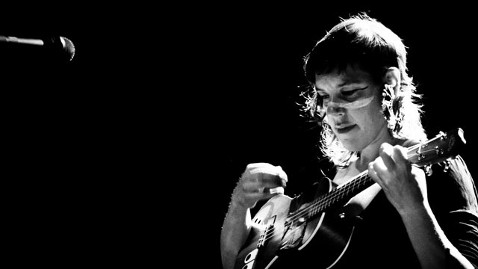Tune-Yards: More Than Just 'One Chick With a Ukulele'
D.I.Y. crooner Merrill Garbus initially began Tune-Yards (stylized as "tUnE-yArDs") as a solo project, in which she used looping pedals and drums to back her vocals and ukulele-playing. The 2009 debut, " Bird-Brains," attracted listeners cult-like in their appreciation. Fans, who include the likes of Sean Lennon, don't just like Tune-Yards, they love Tune-Yards.
The daughter of two musicians who met playing square dances, Garbus enjoyed a musical upbringing. She attributes her mother, a piano teacher, with being the first to train her ear for "complex musical ideas." Going on to study theater, as well as puppetry, Garbus draws upon "that practice of commanding an audience" in her live shows.
"I think, especially starting off as a solo performer, you really need to have that ability to bring people in because you're not a loud band," said Garbus. "You're one chick with a ukulele."
Tune-Yards has since incorporated bassist Nate Brenner, as well as saxophones, into the sophomore album, " Whokill," released in 2011 on 4AD. The New England native found her move to Oakland, Calif., to be a liberating experience that also helped inspire the record's new sound. Said Garbus: "Oakland as a city, I would say, really influenced the music in the sounds that I was hearing. There's sirens, there's birds with strange urban sounds behind them. And also just a very new energy about my life."
Another direct result of relocating to the West Coast, the socially conscious artist found herself identifying with elements of the Occupy movement. While Garbus felt "involved" to be too strong of a word to describe her participation in Occupy Oakland, she divulged she has attended one of the marches to occupy the port.
"When I was writing the album, there was a lot of protesting going on. And that was new to me, that sense of real danger of violence happening in my own community," said Garbus.
Clashes with police are transformed into song in "Riotriot," which begins softly, "I have a secret to tell you / About the night I met you / You had come to put handcuffs on my brother / Down in the alleyway," and builds to a boiling point. "There is a freedom in violence that I don't understand / And like I've never felt before."

Merrill Garbus of Tune-Yards. (Peter Carter)
Last fall, Garbus had the opportunity to join one of her idols and no stranger to social activism, Yoko Ono, on stage as part of the Iceland Airwaves festival in Reykjavik. Covering Ono's " We're All Water," Garbus recalled being stirred by the original performance she had watched:
"I had seen a film of Yoko and John [Lennon] doing that song on a variety-type TV show-Dick Cavett, I think. And they just blew up the place. It was network TV but they just radicalized the entire space. And that's what I love and am so inspired by with Yoko's work, is how she just doesn't pay any attention … to what people are expecting or think about her."
That ability to dismiss expectation is something Garbus has challenged herself to take up. The performer admits, "I am extremely uncomfortable with dancing on camera." Citing insecurity about "body image or fear of my weight as a woman or girl," Garbus said she struggled to even refer to herself as a "dancer," despite her background in African and Afro-Carribean dance. With the help of music video director Mimi Cave and choreographer Sonia Reiter, Garbus has been able to overcome her lingering doubts.
"I think the 'Bizness' video was so great to me to have to get over that," said Garbus. "There I am dancing on camera, and it's as valid as someone who might look or seem more like a classical dancer or trained dancer."
In addition to dancing, the modern-day Renaissance woman has dabbled in directing and editing music videos for Tune-Yards' " Real Live Flesh" and " Gangsta", as well as scoring a series of short, silent films. Although Garbus considers there's more to discover under the umbrella of being an artist, at the end of the day, she wants to get back to the basics: "Interestingly enough, I think what I want to improve at is music."